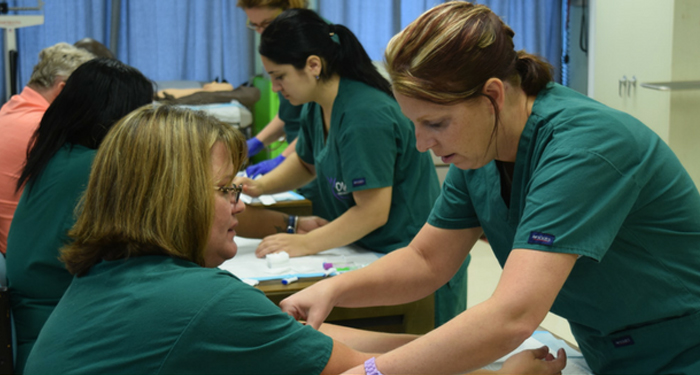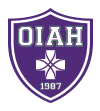

About the Practical Nursing Program:
The OIAH Practical Nurse (PN) diploma offers an accelerated track to a new nursing career! The 12-month Practical Nursing Program (LPN) is taught by experienced and qualified nursing faculty. Students will receive training in a class room setting, modern on site laboratories, and also gain offsite clinical experience!
- No Entrance Exam
- 12- Month Fast Track Program
- Hands-on Training in modern on-campus laboratories
- Financial Aid is available to those who qualify.
The PN program prepares the graduate to competently and safely provide basic nursing care within the State of Ohio Nurse Practice Act mandated scope of practice for selected clients in various structured health care settings. The traditional practice role of the PN has been at the bedside providing routine maintenance medications and treatments for hemodynamically stable clients or general data collection and lifestyle teaching in physician offices. As the nursing shortage intensifies, the current PN role and responsibilities will continue to shift to meet client needs according to the established plan of care.
The student will have opportunity to learn about nursing concepts and skills in a familiar classroom environment as well as through textbooks and online learning modalities. In addition, students will practice simulated experiences in the skills lab and perform competencies in the actual care environment under the supervision of an experienced registered nurse.
Successful completion of the first year of the Nursing Education Program will lead to a diploma and eligibility to take the National Council Licensure Examination for Practical Nurses (NCLEX-PN).
Practical Nursing Diploma Coursework
| Course Number | Course Title | Credit Hours |
|---|---|---|
| ALH 140 | Allied Health Nutrition (5 Weeks) | 0.5 |
| ALH 150 | Allied Health Study Skills (5 Weeks) | 0.5 |
| BIO 140 | Integrated Body Science | 4 |
| NRS 100 | Medical Terminology/Charting | 1.5 |
| NRS 101 | Practical Nursing Foundations | 4 |
| NRS 110 | Math for Nursing Medication Administration | 3 |
| NRS 111 | Nursing Pharmacology | 3.5 |
| Course Number | Course Title | Credit Hours |
|---|---|---|
| ALH 130 | Allied Health Informatics | 1 |
| HOL 101 | Holistic Foundations Historical Survey | 2 |
| BIO 175 | Holistic Human Functioning | 4 |
| HOL 120 | Therapeutic Herbology | 1 |
| COM 110 | Therapeutic Communication | 3 |
| NRS 102 | Integrative Nursing | 6 |
| Course Number | Course Title | Credit Hours |
|---|---|---|
| NRS 106 | Legal and Ethical Practice | 3 |
| HOL 102 | Holistic Interventions | 2 |
| NRS 103 | Integrative Nursing II | 8 |
| NRS 112 | IV Therapy Competency | 1 |
| Course Number | Course Title | Credit Hours |
|---|---|---|
| PSY 100 | Developmental Psychology | 3 |
| NRS 104 | Lifespan Nursing | 7 |
| NRS 109 | Practice Transitions | 2 |
Practical Nursing Program – FAQs
How do I apply for the nursing program?
Contact the admissions department of OIAH at (937)237-1010 to begin the process.
What is the application process?
Meet with admissions to complete an enrollment packet.
Is there a waiting list?
Currently OIAH does not have a waiting list for the PN Program.
Do I have to take "fluff" classes?
Not at all! All classes in the PN Program at OIAH are essential for you to earn your diploma.
What is OIAH's PN pass rate for the NCLEX (licensing) exam?
OIAH’s passage rate for the 2019 year was 91%.
Where can I work as an LPN?
In hospitals, private practice medical offices, surgical centers, emergency medical facilities, health maintenance organizations (HMO’s) & long term care facilities. Remember that state licensing & other factors may limit the LPN role.
PN Course Curriculum
ALH 130 Allied Health Informatics (10 theory hours /1 credit hours)
This course introduces current technology routinely utilized in patient care settings and learning environments. The course discusses charting in the electronic health record and maintenance of client confidentiality. Students will explore potential ethical and legal issues associated with use of technology in health care.
ALH 140 Allied Health Nutrition (5 theory hours/0.5 credit hours)
This course introduces basic nutritional concepts to support safe, effective client care. Students learn how to complete nutritional assessments and encourage healthy eating. Students explore sources of nutrition and diets that support various client populations across the lifespan.
ALH 150 Allied Health Study Skills (5 theory hours/0.5 credit hours)
This course prepares the incoming student for the challenges of healthcare education through the introduction of basic study skills, test-taking strategies, and time management techniques.
BIO 140 Integrated Body Science (30 theory hours/20 laboratory hours/4 credit hours)
This course introduces components of the biological and physiological domains that impact the overall perception of wellness. The course explores principles of biology, microbiology, chemistry, physics, and nutrition. Students will learn laboratory safety and basic scientific techniques.
BIO 175 Holistic Human Functioning (30 theory hours/20 laboratory hours/4 credit hours)
This course introduces the structure and function of major human body systems. The course will discuss the relationship of individual body systems to the overall perception of wellness. Students will visualize major anatomical structures and develop an understanding of integrative function.
COM 110 Therapeutic Communication (30 theory hours/3 credit hours)
This course outlines the key components of therapeutic communication and explores practical approaches and applications. Students will learn how to utilize the electronic health record to communicate information to clients and the interdisciplinary team. Students will practice basic principles of neuro-linguistic programming.
HOL 101 Holistic Foundations: Historical Survey (20 theory hours/2 credit hours)
This course focuses on the historical development of integrative approaches to healing and healthcare. Integrative medicine promotes an expanded view of healing by combining both conventional and complementary methods of diagnosis and treatment to enhance the healing process and promote overall well-being. The course explores the history of holism and integrative approaches.
HOL 102 Holistic Interventions (20 theory hours/2 credit hours)
This course provides a theoretical overview of holistic interventions. The course explores how integrative nursing practice supports the implementation of holistic modalities in the care of diverse client populations throughout the lifespan.
HOL 120 Therapeutic Herbology (10 theory hours/1 credit hour)
This course explores complementary and alternative approaches to promote, maintain, and restore health balance using herbal medicine. Students will learn how to complete a holistic assessment and identify potential indications and contraindications for herbal therapy. Students will explore the possible interactions associated with coadministration of herbal therapies and modern medicines.
NRS 100 Medical Terminology/Charting (15 theory hours/1.5 credit hours)
This course introduces basic medical terminology and the central functions of the electronic health record. Students learn to recognize the parts of medical terms that can assist in identifying meanings and definitions. Students discuss the components of a medical chart and practice introductory charting.
NRS 101 Practical Nursing Foundations (30 theory hours/20 laboratory hours/4 credit hours)
This course introduces beginning knowledge and skills that serve as the foundation for a career in nursing. The course implements the holistic human functioning patterns to organize nursing problems and traditional interventions. Students will learn complementary and alternative approaches to support the holistic health and wellness of various client populations. Students will learn and perform basic patient care skills including the collection of objective and subjective data, implementation of nursing interventions, and contribution to the nursing plan of care.
NRS 102 Integrative Nursing I (30 theory hours/20 lab hours/60 clinical hours/6 credit hours)
This course explores chronic health alterations in adult and geriatric populations. The course emphasizes cultural competence and increases awareness of health disparities. Students will practice provision of safe, competent nursing care and perform basic nursing skills.
NRS 103 Integrative Nursing II (30 theory hours/8 credit hours)
This course explores acute health alterations in adult and geriatric populations. Students will focus on assisting clients to maintain or restore perceived wellness within the mind-body-spirit connection. The course introduces grief, death and dying, palliative support, and postmortem care.
NRS 104 Lifespan Nursing (30 theory hours/7 credit hours)
Overview course designed to familiarize the student with nursing care of the family unit in community and acute care settings. The student will apply concepts of normal growth and development in providing holistic nursing care and planning health promotional teaching interventions. The course features modules on care for the pregnant female, the birthing process, routine newborn care, well childcare, and mental illness in the community issues. The course includes 10 Hrs. of clinical weekly.
NRS 106 Legal and Ethical Practice (30 theory hours/3 credit hours)
This course highlights the legal components and concepts needed for professional practice in the changing health care environment. The role of ethics in judgment and decision making will be reviewed. The importance and implications of consistently positive and professional interactions between and among all health care delivery disciplines will be explored.
NRS 109 Practice Transitions (20 theory hours/2 credit hours)
Synthesis course to review and link all the previous course work for success on the NCLEX-PN exam. A variety of guest lectures, computer-assisted instruction, and tailored instruction will assist the student to build competence and confidence in his/her future role as a nurse.
NRS 110 Math for Nursing Medication Administration (30 theory hours/3 credit hours)
This course identifies and reviews the mathematical principles and computations essential to medication administration. Students will explore practical measures to safely deliver ordered medications to clients across the lifespan.
NRS 111 Nursing Pharmacology (25 theory hours/3.5 credit hours)
This course prepares practical nurses to safely deliver ordered medications. The course uses a prototype model to assist the learner with identification of drug class actions, indications, adverse effects, precautions, contraindications, interactions, and nursing considerations.
NRS 112 IV Therapy Competency (5 theory hours/1 credit hour)
This focused nursing course exploring the concepts central to Intravenous Therapy planning, delivery, and monitoring. The course reviews the Ohio rules and regulations concerning IV therapy administration by licensed practical nurses. The student will have supervised hands-on experience in the classroom, laboratory, and finally the clinical environment to demonstrate mastery. The course includes 15 Hrs. of lab/clinical.
PSY 100 Developmental Psychology (30 theory hours/3 credit hours)
Theoretical course to assist the student in differentiating normal and abnormal behaviors and adaptation patterns across the lifespan. The generally recognized growth and development theories will be explored through practical application to teaching-learning scenarios. Holistic approaches of theory application in the health care environment will be reviewed.
Admissions and Enrollment
Each program has its own set of Admissions requirements in order to enroll. Please view the following document to see the Admissions Policy for the Practical Nursing Program. All applicants for programs must be 18 years or older and a high school graduate or possess a GED certificate.
Disqualifying Offenses for Enrollment
A criminal background could prevent enrollment into the Practical Nursing program. Please click the PDF below to view disqualifying offenses.
Contact Information
Administrative Offices
Phone: 937-237-1010
Fax: 937-237-0506
Email: help@oiah.edu
Admissions Office
Email: admissions@oiah.edu

